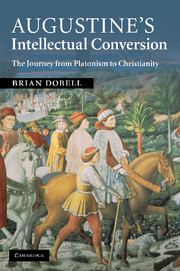Book contents
- Frontmatter
- Contents
- Preface
- Note on translations and references
- Chronological table of Augustine's writings
- List of abbreviations and texts
- Introduction: Augustine's conversion to Christianity
- PART I THE WAY OF AUTHORITY AND ‘THE FALSITY OF PHOTINUS’
- PART II THE WAY OF REASON AND THE ASCENT OF THE SOUL
- 3 The way of reason
- 4 The problem of evil and the development of Augustine's metaphysics
- 5 The graded ascent
- 6 The rejection of Platonic ascent
- 7 The Ostia ascent
- Conclusion: Augustine the Porphyrian
- Appendix: true and false in Soliloquies II
- Bibliography
- Index
6 - The rejection of Platonic ascent
Published online by Cambridge University Press: 01 June 2010
- Frontmatter
- Contents
- Preface
- Note on translations and references
- Chronological table of Augustine's writings
- List of abbreviations and texts
- Introduction: Augustine's conversion to Christianity
- PART I THE WAY OF AUTHORITY AND ‘THE FALSITY OF PHOTINUS’
- PART II THE WAY OF REASON AND THE ASCENT OF THE SOUL
- 3 The way of reason
- 4 The problem of evil and the development of Augustine's metaphysics
- 5 The graded ascent
- 6 The rejection of Platonic ascent
- 7 The Ostia ascent
- Conclusion: Augustine the Porphyrian
- Appendix: true and false in Soliloquies II
- Bibliography
- Index
Summary
Augustine's concern with Platonic ascent disappears from view after On True Religion (390/1). However, this is no indication that he suddenly rejected the project; after all, his literary output as a whole dropped off sharply after 391. O'Donnell sees a ‘writer's block’ taking hold of Augustine during the period between 391 and the Confessions, although it is also important to bear in mind that the practical demands of Augustine's ecclesiastical duties had robbed him of the ‘liberal leisure’ (liberale otium) in which he had once hoped to retire. And on the intellectual side, Augustine was now largely preoccupied with reading Scripture (Augustine readily admitted that his knowledge of Scripure was inadequate) and refuting Manichaeism. That the project of Platonic ascent fell by the wayside after 391 may be attributed to these new (or at least newly pressing) concerns. Augustine's silence is not necessarily an indication that he rejected the project. We must approach the question from a different direction.
In order to resolve this question, I propose to examine Augustine's On Christian Doctrine (begun in 396). This work exhibits a significantly different attitude to the liberal disciplines from that in Augustine's early writings. It amounts to the first expression of his rejection of Platonic ascent.
ON CHRISTIAN DOCTRINE (396)
Augustine's On Christian Doctrine was written in two distinct stages, separated by some thirty years. In 396–7, Augustine wrote the first two books and the bulk of the third book.
- Type
- Chapter
- Information
- Augustine's Intellectual ConversionThe Journey from Platonism to Christianity, pp. 203 - 212Publisher: Cambridge University PressPrint publication year: 2009



